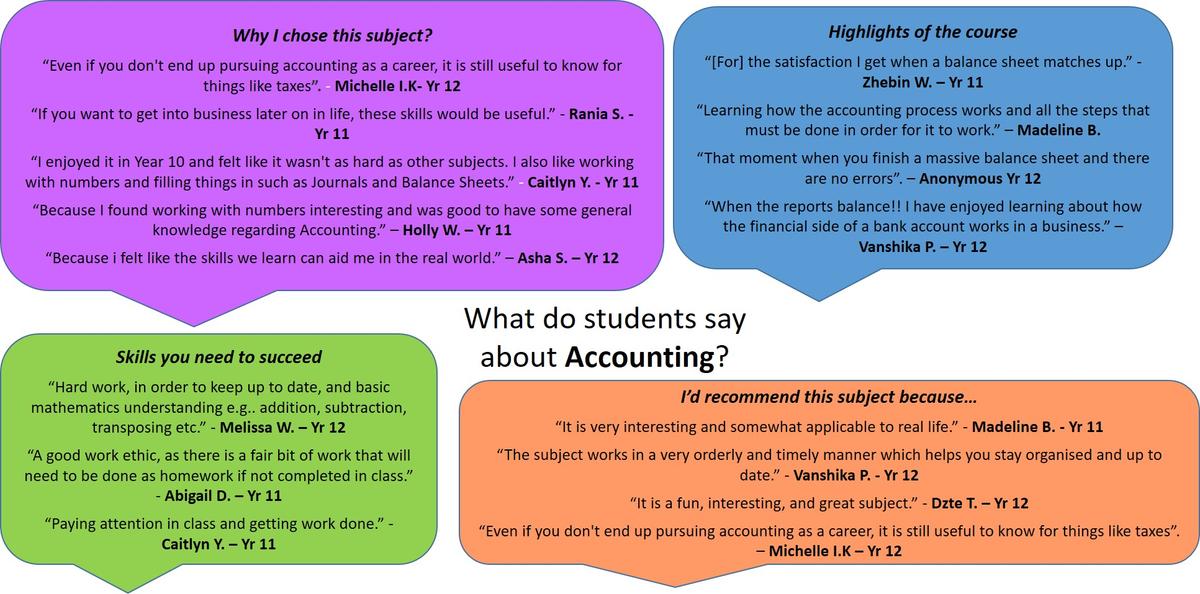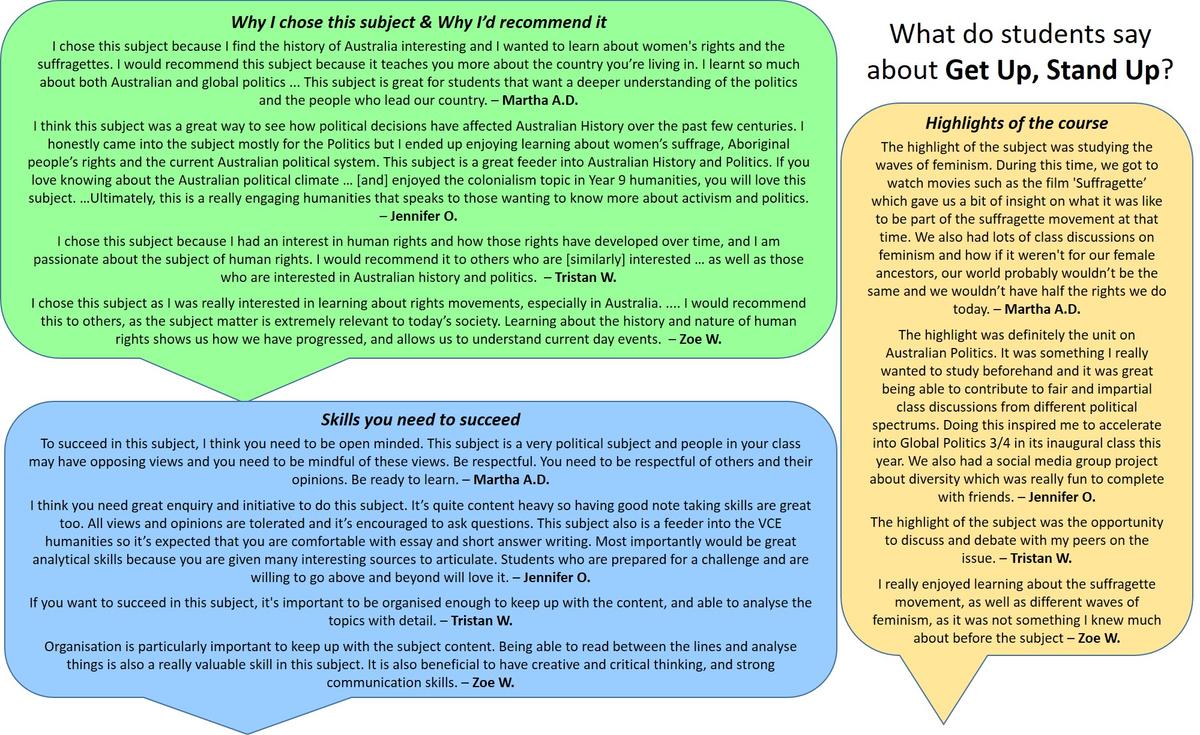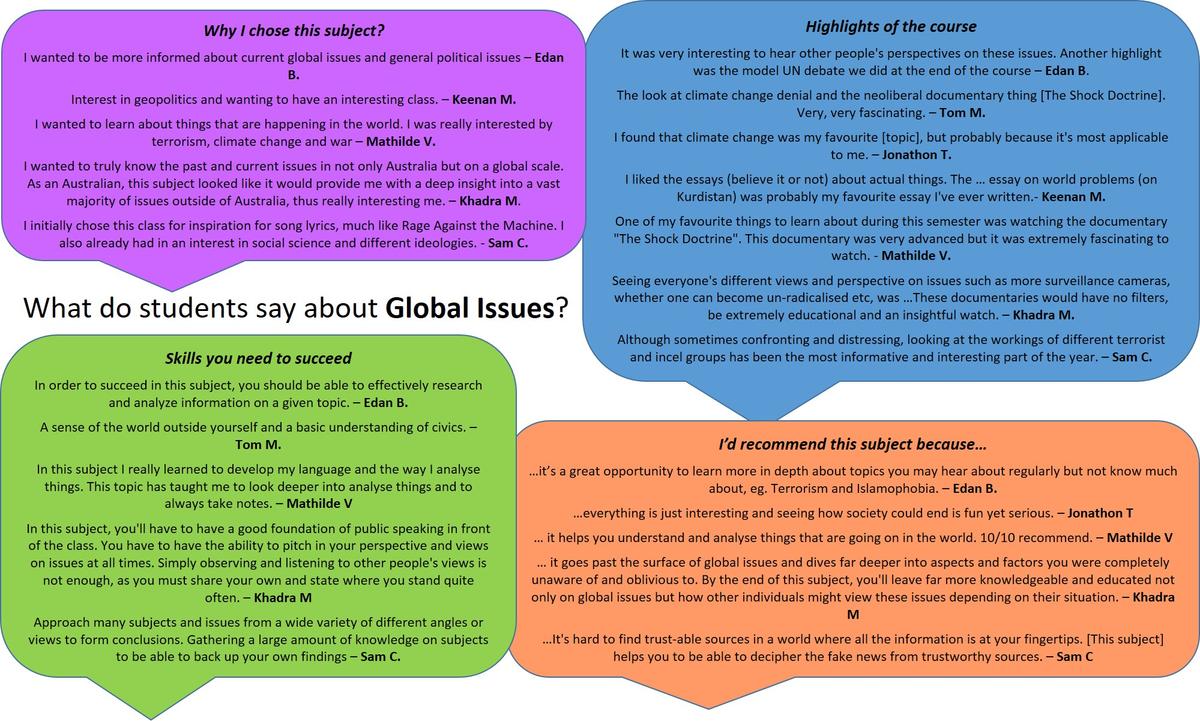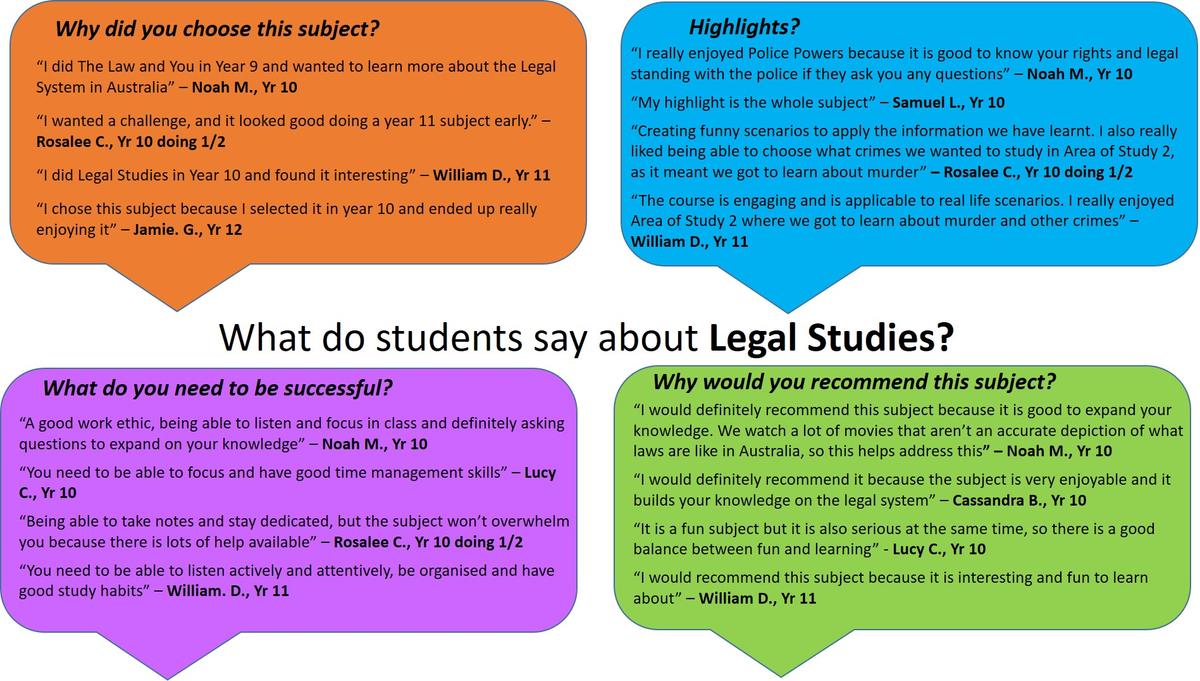Year 10 Humanities

Humanities Electives (Semester Based) | ||
|---|---|---|
Accounting | World at War | Legal Studies |
Economics & Business | Get Up, Stand Up! | Global Issues |
People, Planet & Future | Philosophy |
|
Accounting
Semester Overview
Accounting is the process of recording, reporting and decision-making in a business context. As part of this course, students are introduced to both theoretical and practical aspects of accounting. Financial data will be collected, recorded and reported. Students will learn how to analyse and interpret accounting reports for business decision-making. Students will develop an appreciation of the integral role of accounting in the successful operation and management of a business.
During the semester, students will learn; the reasons for establishing a business and the resources required to start a business, the importance of accounting in the successful operation and management of business, how to record, report and analyse the financial transactions of a small business, the application of recording and reporting on profit to management decision-making, the role and benefits of cash and profit budgeting in planning and control.
Additional Information: Students must have their own non-graphics calculator and bring it to every class.
Economics & Business
Semester Overview
Students participate in the $20 Boss challenge, an immersive learning program that provides students with real money as start-up capital to create, launch and operate their own business venture. Students develop crucial enterprise skills including critical and creative thinking, teamwork and entrepreneurship, as key elements to business success. Students develop their understanding of how the Australian economy and investigate the relationship between economic growth, unemployment and the standard of living. Students explore the way individuals, families, the community, businesses and governments make decisions to allocate resources. This subject aims to enable students to understand the process of economic and business decision-making and its effects on themselves and others, now and in the future.
Get Up, Stand Up! Movements, Rights and Freedoms in Australian society
Semester Overview
Students will investigate the key social movements and political changes that have taken place in Australian society during the 20th and 21st Centuries. Students analyse the different strategies used by social and political forces to shape public understandings and influence policy included the use of protest and popular music. Students will learn how citizens’ political choices are shaped, including the influence of the media and of global events, the key struggles in the women’s movement over the 20th and 21st centuries, including female suffrage, equal pay, reproductive rights, countering violence and sexual assault, rights in the workplace, and equality of representation, the struggle of Aboriginal and Torres Strait Islander peoples for rights and freedoms before 1965 and key events in changing society: 1962 right to vote federally, 1967 Referendum, Reconciliation, Mabo decision, Bringing Them Home Report (the Stolen Generations), the National Apology. These changes are considered within the context of the Australian political system, including the nature of liberal democracy and features of the Australian parliamentary and electoral systems. This subject has links to both VCE Global Politics and VCE 20th Century History.
Global Issues
Semester Overview
Global Issues involved a deep dive into contemporary power structures at the global level. Students explore, explain and evaluate global political issues and events and the forces that shape these. In doing so, they examine the nature and effectiveness of key global actors in their response to global challenges such as the global refugee crisis, development issues, inequality, war, terrorism and climate change. Students learn to develop a critical understanding of the world in which they live and build the knowledge, awareness and analytical skills that underpin active global citizenship. This subject has links to VCE Global Politics.
Legal Studies
Semester Overview
Students will learn about Australia’s legal and parliamentary systems, exploring how they enable change, progression and social cohesion. Students develop an understanding of various branches of laws in society, focussing on the comparison of the two main branches: criminal and civil law. Students also examine the operation of parliament and their primary role as lawmakers. They will investigate courts within the Victorian court hierarchy, including their roles in interpreting, applying and creating laws to supplement parliament’s role in society, and examine the advantages and disadvantages of the jury system.
The World at War
Semester Overview
The twentieth century was a critical period in Australia’s social, cultural, economic and political development. Students investigate topics around the transformation of the modern world during a time of political turmoil, global conflict and international cooperation to gain an understanding of Australia’s development, its place within the Asia-Pacific region and its global standing. The World at War covers the causes of World War I, the ‘war to end all wars’, the interwar period between 1918 and 1939, including the treaty of Versailles, the roaring twenties, the Great Depression, the League of Nations and the rise of communism and fascism. Students will also develop their understanding of World War II, including alliances, major battles, the Holocaust, Australia’s involvement in World War II on the Western Front and in the Pacific region, and the conclusion and lasting effects following World War II. Students will develop their historical knowledge, understanding and skills by inquiry questions and through the use and interpretation of sources.
People, Planet & The Future
Course Description
This multi-domain subject (Humanities and Science) will allow students to focus on the interrelationship that humans have with our environment. The course will provide strong foundations and direct pathways for VCE Environmental Science and VCE Geography. Using case studies including climate change, biodiversity change and health pandemics, students taking this subject will be able to understand how humans can plan for a sustainable future.
It will look at the interrelationships between solid earth (lithosphere), water (hydrosphere), air (atmosphere) and living organisms (including humans) and how these have and are changing over time. On completion of this subject, students will be able to explain sustainability principles, such as the conservation of biodiversity, ecological integrity and intergenerational equity, and how past and present processes and observations can be used to make reliable and scientifically-defensible predictions about the future. Students will undertake fieldwork as part of this course.
Students will develop an:
- interest in environmental science and an appreciation of how this multidisciplinary knowledge can be used to understand contemporary issues.
- understanding of environmental worldviews of people and their implications for environmental management
- understanding of Earth as a dynamic planet consisting of four interacting systems: the lithosphere, atmosphere, hydrosphere and living organisms, including humans.
- appreciation of the complex interactions, involving multiple parallel processes, that continually change Earth systems over a range of timescales,
- understanding that our knowledge of the environment has developed over time; is used in a variety of contexts; and influences, and is influenced by, social, economic, cultural and ethical considerations
- skills to identify, analyse and explain significant interconnections within places and between places over time and at different scales, and evaluate the resulting changes and further consequences
- skills to collect and record relevant data and information, using ethical protocols, from reliable and useful primary and secondary sources
- skills to select, organise and represent data and information in different forms, including by constructing special purpose maps that conform to cartographic conventions, using digital and spatial technologies as appropriate
- skills to analyse and evaluate data, maps and other geographical information using digital and spatial technologies and Geographical Information Systems as appropriate, to develop identifications, descriptions, explanations and conclusions that use geographical terminology
Victorian Curriculum Assessment Areas
Humanities
- Geographical Knowledge
- Geographical Concepts and Skills
Science
- Science Understanding – Biological/Chemical and Physical sciences
- Science Understanding – Science as a human endeavour
- Science Inquiry Skills
Capabilities
- Ethical capability
- Critical and Creative Thinking
It can be considered as one Humanities Subject, OR as a Science elective. This is not a Science core class
Philosophy
The Year 10 Philosophy elective is based on the Victorian Curriculum English standards. This subject aims to develop students’ critical and analytical thinking skills through the investigation of key philosophical concepts, issues and problems. Students will explore ideas related to ethics, identity, free will and logic and reasoning through a wide range of visual and written texts in order to develop higher order thinking, problem solving skills, critical analysis and reflective thinking and writing. The themes explored require a maturity and willingness to discuss mainstream and non-mainstream ideas.
Students will be able to:
- Investigate the characteristic of effective questions in different contexts to examine information and test possibilities.
- Suspend judgements to allow new possibilities to emerge and investigate how this can broaden ideas and solutions.
- Challenge previously held assumptions and create new links, proposals and artefacts by investigating ideas that provoke shifts in perspectives and cross boundaries to generate ideas and solutions.
- Examine and range of rhetorical devices and reasoning errors.
- Examine how to identify and analyse suppressed premises and assumptions.
- Investigate the nature and use of counter examples structured as arguments.
- Critically examine their own and other thinking processes and discuss factors that influence thinking, including cognitive biases.
- Investigate how the use of a range of learning strategies can be monitored, evaluated and re-directed as necessary.
- Investigate the kind of criteria that can be used to rationally evaluate the quality of ideas and proposals.





